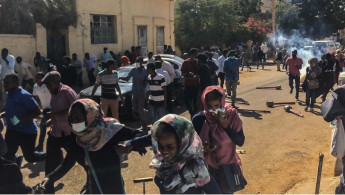Police fire tear gas at night-time protests in Khartoum
Sudanese police fired tear gas at hundreds of protesters in the capital Khartoum and its twin city of Omdurman on Tuesday as demonstrators staged night-time rallies against the government.
The after-dark demonstrations were the latest in more than a month of escalating protests against President Omar al-Bashir's three-decade rule.
Chanting "people want a new Sudan," hundreds of protesters demonstrated in the capital's northern district of Bahari as darkness fell but riot police quickly confronted them with tear gas, witnesses said.
"There's heavy firing of tear gas and there's smoke everywhere," a demonstrator said without revealing his identity for security reasons.
"Many protesters are coughing, but some are picking up tear gas canisters and throwing them back at the police."
Earlier on Tuesday, demonstrators had staged a separate rally in Omdurman, across the Nile, witnesses said, adding it was also dispersed with tear gas.
Shouting "overthrow, overthrow" and "freedom, peace and justice," the catchword slogans of the protest movement, the demonstrators in Omdurman had gathered near the home of a dead protester, witnesses said, adding that rallies were also staged in the city as darkness fell.
More rallies called
The doctors' branch of the Sudanese Professionals' Association said the protester had died on Monday, four days after being wounded when demonstrators clashed with security forces in Khartoum.
The SPA, an umbrella group of unions representing teachers, engineers and doctors, has taken the lead in organising the protests after hundreds of opposition activists were detained, and its doctors' branch has taken casualties.
It had called for night-time rallies on Tuesday, as well as demonstrations across "all towns and cities" on Thursday.
Human rights groups say several medics have been among more than 40 people killed in clashes with the security forces since the protests erupted on December 19.
The authorities say 26 people have been killed, including at least one doctor, but blame rebel provocateurs they say have infiltrated the ranks of the protesters.
The mushrooming protests are widely seen as the biggest threat to Bashir's iron-fisted rule since he took power in an Islamist-backed coup in 1989.
Triggered by the government's tripling of the price of bread, which brought demonstrators onto the streets of the eastern farming hub of Atbara and other provincial towns, the protests rapidly spread to the metropolis and other big cities as people vented their anger against the government.
Days before the protests erupted on December 19, Bashir met Syrian dictator Bashar al-Assad in Damascus, becoming the first Arab leader to visit Syria since a brutal conflict broke out there.
Agencies contributed to this report.
Follow us on Twitter: @The_NewArab





 Follow the Middle East's top stories in English at The New Arab on Google News
Follow the Middle East's top stories in English at The New Arab on Google News


